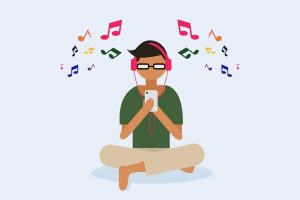Writing Rainbow: New musicians are redefining queer artistry
With the release of Troye Sivan’s sophomore album, #20GayTeen is now in full “Bloom.” The aptly-titled record, which came out Friday, has already been lauded as one of the best pop albums of 2018 — and undoubtedly so.
Upon first listen, I found myself awestruck by Sivan’s maturity and transformation. On the opening track “Seventeen,” the gay artist reflects on a relationship with an older man he met on Grindr while underage. It’s a deeply introspective song, one that signals a remarkable departure from the starry-eyed idealism Sivan displayed in his debut LP “Blue Neighbourhood.” And throughout the rest of “Bloom,” Sivan isn’t afraid to be honest about the realities of queer romance, as exemplified by songs such as “Postcard” and “Plum.” While it may seem as if “Bloom” is merely a bold proclamation of Sivan’s sexuality, in reality, it is so much more.
Leading up to the album’s release, Sivan stated in several interviews that he wanted to create music that honestly depicted his life — as well as the lives of other young people grappling with their sexual identity. That to me is absolutely incredible.
Troye Sivan is part of a new generation of queer artists changing the face of the music industry. Joining him are Hayley Kiyoko, Kehlani, Kim Petras, Kevin Abstract, Halsey, Olly Alexander and countless others.
Sure, there have been plenty LGBTQ+ artists who rose to fame in the past — but what sets this group apart from the others? The answer is simple: Their music has an incredible ability to resonate with a generation of young listeners who can empathize with their experiences as queer individuals.
In many ways, this crop of artists are byproducts of the incredible progress that the LGBTQ+ community and music industry have made over the years. Proudly embracing their identities, these artists are finding their place in music and pop culture through songcraft that is both accessible to the mainstream and deeply rooted in the queer community.
Though I could continue praising the artists leading this queer pop revolution, it would be remiss of me to not acknowledge all the queer artists who came before them. We had David Bowie, who transformed the way people associate music with self-expression, particularly with regard to sexuality and androgyny, through his alter ego Ziggy Stardust.
We have Elton John and Freddie Mercury, who pioneered publicization of their sexualities with groundbreaking performance styles. We have RuPaul, who introduced drag performance to the rest of the world with “Supermodel (You Better Work).” And we have Lady Gaga, who brought gay culture to the masses with mega-radio hits and mobilized young people to engage in LGBTQ+ activism. The list goes on and on.
Without their accomplishments, the current generation of artists would not be able to openly share their stories the way they do today. As a member of the LGBTQ+ community, I am extremely grateful to be living in a time when young people can listen to music that accurately represents their lives — and it’s astounding to think that just several years ago, people like me were growing up without artists creating music that reflected their lives, their feelings and their sexual identities.
Music has always been a medium I could use to help me better understand my emotions, but there has only been a handful of times when I found music or artists that truly resonated with me as a queer individual.
The first encounter was discovering Lady Gaga’s “Born This Way” in eighth grade. It was liberating to hear someone sing about self-love and acceptance on mainstream radio, especially because I had recently undergone a reckoning with my own sexuality. In the years after Lady Gaga’s queer anthem, music about the queer experience devolved to merely appease top-40 listeners. I felt a disconnect from mainstream music celebrating gay culture and identity — until I discovered Troye Sivan, who boldly confronts the realities of queerness in music.
For the first time in a long time, I felt understood in a way I hadn’t experienced since Lady Gaga. The liberation and freedom she inspired in me was finally replicated again. This feeling — one of boldness, pride and honesty — is one I hope to never stop feeling, and I’m glad that queer artistry is finally reaching the forefront of music.
Allen Pham is a senior majoring in public relations. He is also the editor-in-chief of the Daily Trojan. His column, “Writing Rainbow,” runs every other Friday.

